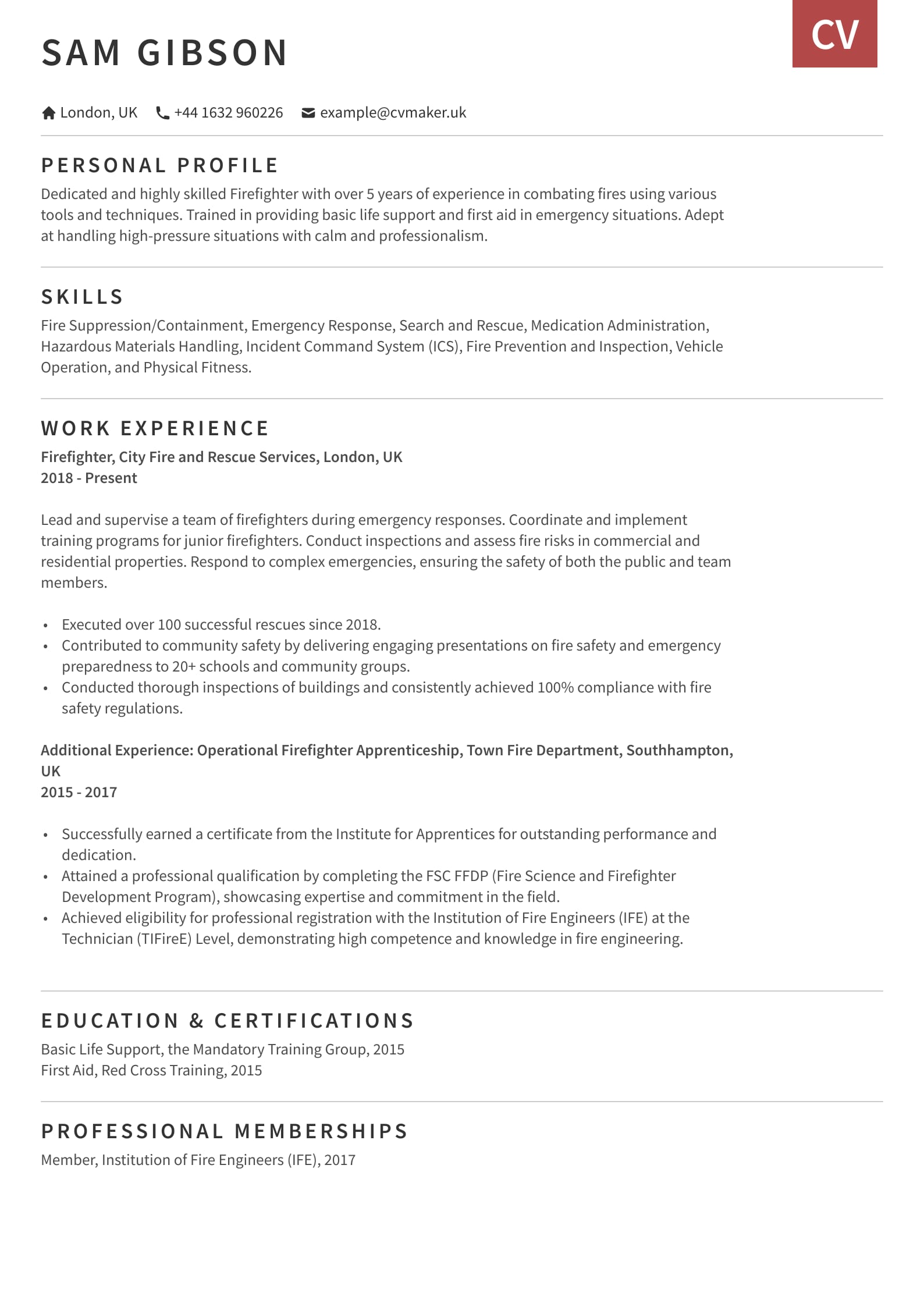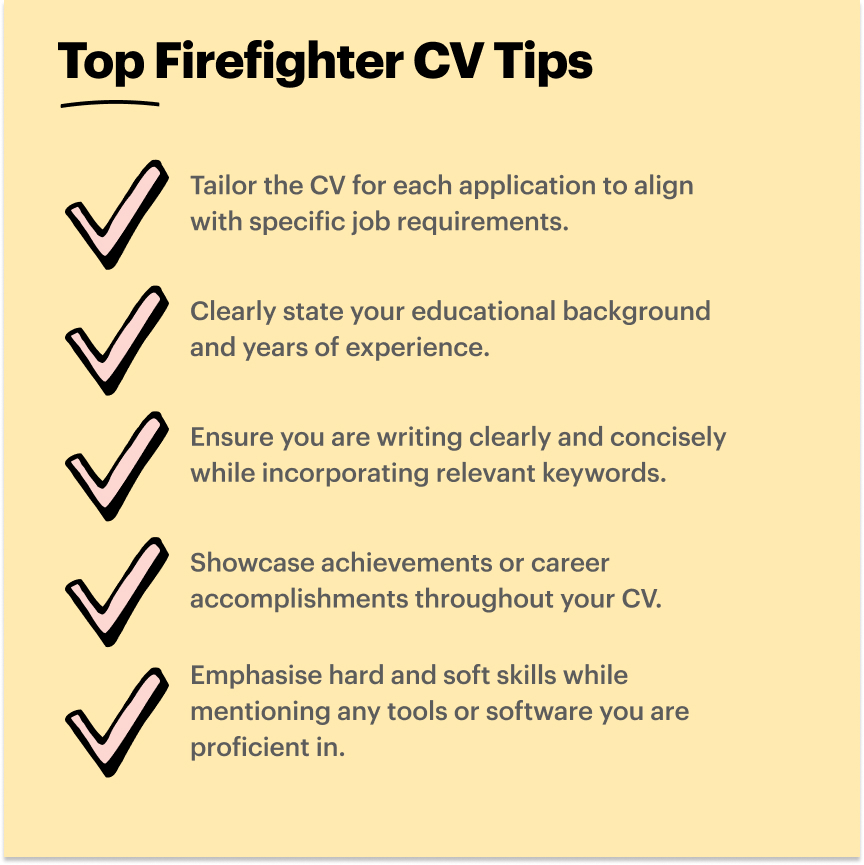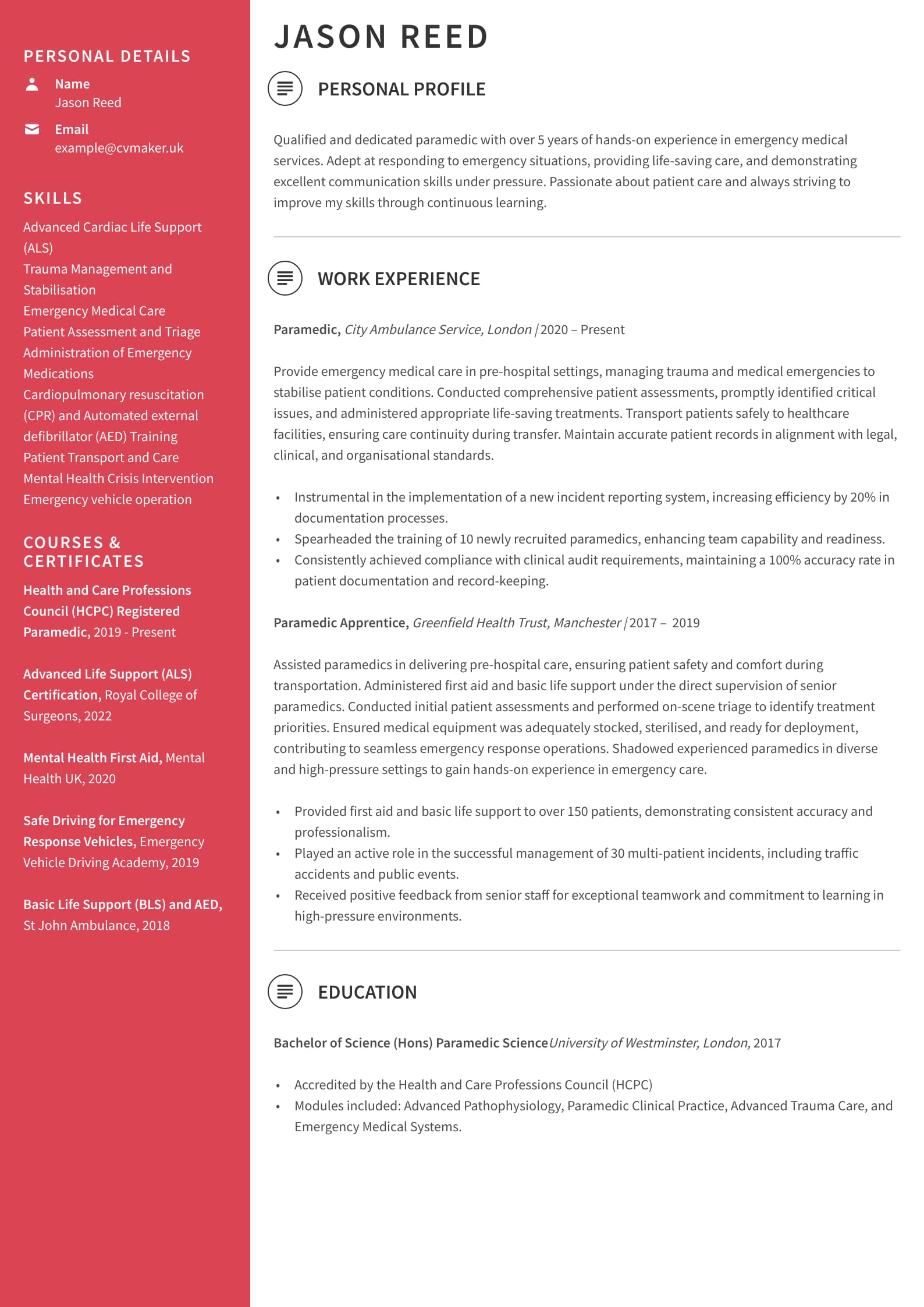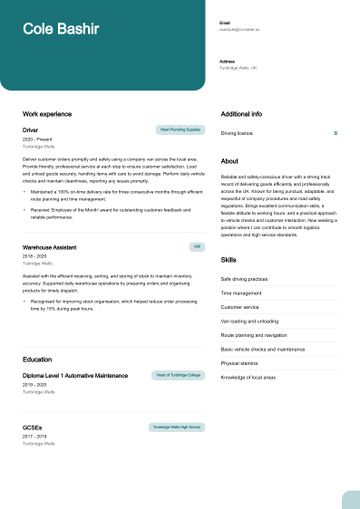
How to Write a Firefighter CV: Examples and Tips
Being a firefighter is one of the most dynamic and exciting jobs imaginable. But behind the flashing blue lights and drama of the role is a rock-solid CV just like any other. With fierce competition, aspiring emergency service workers need a modern CV to clearly and competently reflect their skills, background and aptitude for this challenging position.
In this comprehensive guide, we show you how to write a good CV as a UK fireman or firewoman, how to improve your CV as a developing professional and offer a CV template you can use in future applications.

Firefighter CV example

Download this firefighter CV sample in PDF.
Sam chose the modern Otago CV template because it has a professional look and is easy to read. It clearly shows the professional certifications and professional memberships, which are important parts of a firefighter's CV. The layout, using the page’s full width, makes this CV neat and to the point.
What to include in a firefighter CV?
Just like other public service professionals such as a medical expert or civil servant, you need to cover some fundamentals before including more industry-specific requirements. Let’s cover the basics first.
Remember to include:
Personal details
Personal profile
Skills
Education
Work experience
Courses and certificates.
To work in the UK Fire Service - officially the Fire and Rescue Service (FRS) - you will need to show you have a current driving licence (with no more than 3 points for minor offences), a recent medical check and a Basic DBS Check to screen for any unspent criminal convictions.

For deeper insights into the how to start the CV writing process with a master CV, look at our blog.
Pro Tip
When it comes to penning your application, we recommend creating a master CV. This contains your entire work history, education, further training, skills and references. This all-inclusive document will serve as a starting point for job-specific CVs later on.
How to write a personal profile for a firefighter CV
When creating a personal profile on a CV, it’s important you fully understand the requirements of the role and its challenges. Emergency services personnel in the UK are responsible for a variety of tasks, including educating the community, conducting fire safety inspections, participating in training as well as responding to emergencies.
Plenty of other roles including part-time work, security guard or factory worker have aspects in common with fire department personnel such as juggling two jobs, vigilance and being a team player respectively. Give your application added depth by taking a look at different industries.
On-call Firefighter CV personal profile example
Dynamic and community-focused individual with 5 years experience providing emergency services in a part-time capacity. Committed with excellent availability and responsiveness rates, equipped with essential firefighting skills acquired through comprehensive training. Excels in high-pressure situations, ensuring public safety and efficient incident response in rural and suburban settings.
Firefighter CV personal profile example
Dedicated and skilled firefighter with 7 years experience and a robust understanding of fire safety and emergency response procedures. Possesses a solid foundation in technical firefighting skills and physical fitness, complemented by strong problem-solving abilities. Adept at working collaboratively in a team to effectively manage fire incidents and ensure community safety.
Firefighter apprentice CV personal profile example
Energetic and aspiring firefighter, currently undergoing a 3-year apprenticeship to master the intricacies of fire science and safety. Exhibits a keen interest in learning advanced firefighting techniques and emergency medical response. Highly motivated to contribute to team efforts and develop a comprehensive understanding of fire service operations.
Firefighter instructor CV personal profile example
Experienced fireman with 8 years of experience and a profound knowledge of firefighting tactics and safety protocols. Specialises in training and mentoring recruits, with an emphasis on fostering skills in fire prevention, equipment handling and emergency response. Demonstrates exceptional leadership and communication skills, crucial for guiding aspiring firefighters.

What skills do firefighters need on their CVs?
Pursuing a firefighting career in the UK goes beyond the courage to face flames and save lives. It's about knowing the essential skills to put on a CV required to fulfil many everyday duties in this profession.
Must-have skills like physical endurance and swift decision-making form the backbone of this demanding role. Technical expertise, gained from specialised training, empowers you to handle advanced firefighting equipment and understand complex safety protocols.
Equally important are your soft skills, such as teamwork, clear communication and the ability to stay calm under pressure. Firemen or firewomen also share transferable skills from other industries such as personal trainers, drivers and volunteer workers. Take a look at these CV examples to gain inspiration.
Pro Tip
Strategically present your skills to best showcase your suitability for the role.
General must-have skills:
Physical fitness
LGV Class 2 driving licence (or gained within 18 months of joining)
Communication skills
Problem-solving ability
Teamwork
Adaptability and flexibility
Attention to detail
Resilience and stress management
| Hard skills | Technical skills | Soft skills |
|---|---|---|
| Fire suppression | Firefighting equipment operation | Effective communication |
| Emergency medical techniques | Breathing apparatus usage | Team collaboration |
| Hazardous materials handling | Fire prevention and safety compliance | Decision-making under pressure |
| Rescue operations | Emergency vehicle operation | Emotional resilience |
How to list skills on a firefighter CV
Hard and technical skills, which are your tangible qualifications and proficiencies in specific firefighting techniques and tools, should be distinctly outlined in a dedicated section. This makes it easy for potential employers to quickly assess your technical capabilities.
Soft skills, such as communication, teamwork, and adaptability, are best highlighted within your personal profile, work experience section, and cover letter. These skills are integral to the role of a firefighter and should be demonstrated through real-world examples.
Firefighters need to attain a level of physical fitness, which is tested during the application process. See the modern firefighter fitness guide for more information.
Presenting relevant work experience on a firefighter CV
Knowing how to write work experience on a CV is vital for demonstrating the practical application of skills in real-life scenarios, a key consideration for employers in this field.
Similar to other on-call professions such as nurse or midwife, you need to show a range of responsibilities. For a firefighter, these may include emergency response, community education, professional training and conducting fire safety checks.
What should each work experience entry include?
Job title of current or previous role
Organisation name and location
Dates of employment (month/year)
A concise paragraph detailing your duties
Followed by 2–3 bullet points that highlight your key achievements or measurable impact.
Learn more about the work experience section in a CV.
Pro Tip
Your work experience section is an excellent place to present soft skills, such as teamwork, communication and problem-solving under pressure.
For a UK firefighter CV, format work experience entries in chronological order. No more than one paragraph outlining key duties followed by two short bullet points detailing quantifiable achievements.
Joining the Fire Service as a school-leaver or graduate
The Fire Service accepts applications from a range of backgrounds. If you’re joining the fire service as a school-leaver, graduate or after a career change, be sure to leverage as much volunteer experience as possible.
Retained Firefighters make a vital impact on the UK fire service, so don’t be afraid to present this on the same level as paid work experience. Clearly outline the duties performed as well as the skills and knowledge you brought to the team.
Firefighter CV work experience examples
On-call firefighter | Leicestershire Fire and Rescue Service, Leicester | 2019-Present
Provide essential firefighting and emergency response services in a part-time capacity. Demonstrate rapid responsiveness and adaptability, effectively balancing firefighting duties with other employment. Engage actively in community safety initiatives and attend regular training sessions to maintain and enhance skills.
Responded to an average of 50 emergency calls per year, efficiently handling diverse situations including fires and accidents.
Led community fire safety workshops, increasing local awareness and prevention measures by 20%.
Firefighter | Highlands and Islands Airports Limited, Dundee | 2018 - 2022
Served as a full-time firefighter, performing firefighting, rescue operations, and emergency medical assistance. Played a critical role in team-based responses to a wide range of emergencies, ensuring public safety and property protection.
Participated in over 200 emergency responses, demonstrating strong decision-making and teamwork under pressure.
Conducted regular equipment maintenance and safety checks, resulting in a 30% reduction in equipment failures during emergencies.
Firefighter apprentice | Braintree Fire and Rescue Service, Bristol Aerodrome | 2020 - 2021
After completing the Fire Cadets program, completed comprehensive firefighter training, including the Firefighter Foundation Development and Aircraft Rescue and Fire Fighting (ARFF) programmes. Gained practical experience in firefighting, rescue techniques and emergency medical response under supervision in an airfield environment.
Completed all training modules with high proficiency ratings, excelling in Breathing Apparatus and Fire Prevention courses.
Assisted in 40+ simulated emergency drills, honing skills in rapid response and effective communication.
Firefighter instructor | Capita, Moreton-in-Marsh | 2020 - 2023
Led comprehensive training for new firefighter recruits, balancing theoretical teaching with practical field exercises. Focused on instilling core firefighting skills, advanced rescue techniques and emergency management. Regularly updated training content to reflect the latest industry standards and practices, ensuring recruits are well-equipped for modern firefighting challenges.
Trained multiple recruit cohorts with a high success rate, underlining the effectiveness of the training approach.
Developed and integrated a specialised module on hazardous materials, enhancing the overall scope and quality of the training program.
Firefighter CV with little to no experience
If you are joining the fire service with little to no work experience, consider volunteering, work shadowing, joining an apprenticeship program or enrolling with the Fire Cadets to gain valuable knowledge and skills.
For more information about entry-level opportunities in the fire service or other ways you can help your community, see the Fire England website.
Aspiring firefighter | Volunteer and Fire Cadets Experience | 2023-Present
Engage in various volunteer roles and actively participate in the Fire Cadets program, gaining foundational knowledge and skills in firefighting and emergency response. Shadow full-time firefighters which helps develop the confidence to suggest ideas and work as a team, learning emergency medical assistance skills and team collaboration in high-stress environments.
Volunteered over 200 hours in community fire safety campaigns.
Participated in intensive training exercises with the Fire Cadets, developing basic firefighting skills and emergency response techniques.
How to add education to a firefighter CV
Creating the education section on your CV requires a focus on both formal education and relevant certifications. Start by listing your formal education, such as a high school diploma or degree, followed by any specialised security training or certifications you have completed, such as fire marshal training.
Qualification requirements:
The Fire and Rescue Service in the UK considered applications from a variety of educational backgrounds. You can join the fire service straight after leaving school or university. Most fire services in the UK do not ask for specific qualifications. However, you will be expected to pass English and Maths GCSE grade C (level 4) or equivalent.
University degree:
BSc (Hons) Fire and Rescue, University of Wolverhampton, 2017
GCSEs qualifications:
Riverside Academy | Leicester, 2017 - 2022
Maths: Grade 4 (C), English: Grade 5 (B), Combined Science: Grade 4 (C), Computer Science: Grade 4 (C), English Language: Grade 6 (B)
National 5 (N5) certificates:
Stirling High School | Stirling, 2017 - 2022
Scottish N5s: English C (4), Maths C (4), History B (6), Chemistry B (5), Art & Design C (4), Computing Science B (6) — GCSE level equivalent in brackets.
How to include apprenticeship or diplomas
Another route into the fire service in the UK is through a recognised apprenticeship scheme. This is a great way to learn on the job and start earning a salary at the same time.
Apprenticeship qualifications should be present on your CV in much the same way as other educational achievements - with the name of the certificate, awarding body and year of completion.
Operational Firefighter Level 3 (Advanced) Apprenticeship, Brighton College, 2023
If your apprenticeship provided practical experience in the workplace, be sure to elaborate on your duties and skills learned by including the position in your work experience section.
How to list firefighter certifications on a CV
Firefighters constantly train and improve their skills with certifications. The Fire Services College offers a range of certifications from breathing apparatus training to practical fire investigation.
Including additional courses and certificates on a CV shows you are a capable and committed member of the fire service. Position these additional qualifications in their section, including the issuing institution, date of completion and course name.
Key takeaways
For crafting an impressive firefighter CV in the UK, consider these key strategies:
Create a master CV: Compile a comprehensive CV detailing your entire work history, education, training, skills, and references. This master document serves as a reference for tailoring job-specific CVs.
Build a personal profile: Craft a compelling personal profile at the top of your CV. This should be a concise summary of your experience, skills, and career goals, tailored to the firefighting role.
Detail work experience: Clearly outline your work experience, focusing on roles and responsibilities relevant to firefighting. Include quantifiable achievements and specific scenarios that demonstrate your skills.
Include additional certificates: List any firefighting-related certifications or courses you've completed. This shows your commitment to ongoing learning and skill development in the field.
Secure references: Have a list of professional references ready, preferably individuals who can attest to your skills and experiences relevant to firefighting.

Next steps?
Iron out any creases using our intuitive CV builder with 20+ CV templates and professional designs to choose from. To accompany your CV, discover our cover letter templates. If you don’t want to leave anything to chance, connect with our professional CV Writing Service. Draw inspiration from our blog for tips on how to save time, emphasise important sections and make it easier for hiring managers to grasp your unique professional offer.
FAQs
Where do firefighters work?
As well as operating as vital members of the local community, firefighters work in diverse settings from airfields and military establishments, to nature reserves and off-shore environments such as oil rigs. It’s important to be sure which environment you want to work in.
How often do fire crews hire?
Most fire services only recruit once every 12 months, so find out when your target team is next recruiting and time your application accordingly. Find out more your local fire service for details regarding the application process.
How to become a firefighter in the UK?
Apply through a local fire and rescue service, meet age and fitness requirements, and undergo physical and written tests, and interviews.
How long does it take to become a firefighter in the UK?
Several months for the recruitment process, plus around 12-18 weeks of basic training.
Is it difficult to become a firefighter in the UK?
It is competitive, with a rigorous selection process focusing on physical fitness, problem-solving, and teamwork.
How much is a UK firefighter paid in the UK?
Starts at around £22,000 for trainees, with experienced firefighters earning up to £40,000 or more.
What should a firefighter cover letter look like?
The ideal cover letter structure should be concise, professional and tailored to the role, highlighting relevant experiences and commitment to firefighting.



